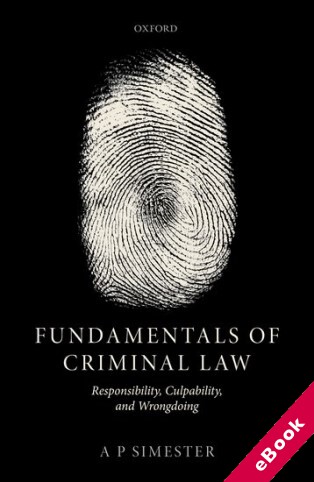
The device(s) you use to access the eBook content must be authorized with an Adobe ID before you download the product otherwise it will fail to register correctly.
For further information see https://www.wildy.com/ebook-formats
Once the order is confirmed an automated e-mail will be sent to you to allow you to download the eBook.
All eBooks are supplied firm sale and cannot be returned. If you believe there is a fault with your eBook then contact us on ebooks@wildy.com and we will help in resolving the issue. This does not affect your statutory rights.
Written by a noted expert in criminal law, this book explores the philosophical underpinnings of the law's major doctrines concerning actus reus, mens rea, and defences, showing that they are not always driven by culpability. They are grounded also in principles of moral responsibility, ascriptive responsibility, and wrongdoing. As such, they engage wider debates about wrongdoing, and about the boundaries between liability and freedom.
This multi-textured analysis allows this book to take more nuanced positions about many important controversies in criminal law. It argues, for example, that liability for omissions and for negligence-and even some strict liability elements-can sometimes be legitimate yet, at the same time, should be relatively rare. It also explains why principles of causation can differ in the criminal law from other contexts; what is wrong with the 'voluntary act' requirement; and why luck can affect the wrongs we commit without changing our degree of blameworthiness for committing them. The book concludes with an account of the major types of defences, and of how they interact with an agent's wrong and her underlying motivations.
The book presents a coherent and rich vision of the criminal law that, by its sheer breadth, makes a distinctive contribution to the literature, of interest to lawyers and philosophers alike.
Key Features: